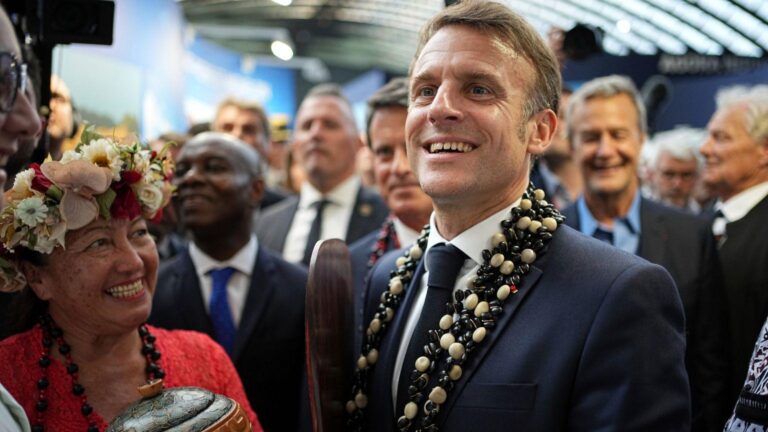French President Emmanuel Macron has announced his decision to withdraw from the upcoming United Nations conference on Palestinian state recognition, signaling a shift in France’s diplomatic approach to the Israeli-Palestinian conflict. The move, reported by The Jerusalem Post, comes amid rising tensions in the region and highlights the complexities facing international efforts to address the long-standing dispute. This development raises questions about the future of global consensus on Palestinian statehood and France’s role within the broader Middle East peace process.
Macron’s Withdrawal Signals Shift in France’s Middle East Policy
Emmanuel Macron’s decision to withdraw from the UN conference on Palestinian state recognition marks a notable departure from France’s historically assertive role in Middle Eastern diplomacy. The move reflects a recalibration of Paris’s approach, balancing its commitment to international law with a pragmatic desire to maintain constructive relations with both Israel and Arab states. This strategic shift suggests France is prioritizing regional stability and multilateral dialogue over symbolic declarations that risk alienating key partners.
The withdrawal unfolds against a backdrop of complex geopolitical dynamics, including ongoing normalization between Israel and several Arab nations and heightened tensions in the Palestinian territories. France’s recalibrated stance emphasizes:
- Support for a negotiated two-state solution through direct talks
- Reinforcement of diplomatic channels with Israel and Palestinian authorities
- Emphasis on regional security and anti-extremism collaboration
| Aspect | Previous Position | New Approach |
|---|---|---|
| UN Engagement | Active participation in state recognition initiatives | Selective involvement, avoiding divisive forums |
| Diplomatic Focus | Strong advocacy for Palestinian rights | Balanced mediation and regional partnerships |
| Relationship with Israel | Cautious criticism over settlement policies | Enhancement of bilateral cooperation |
Implications for International Diplomatic Efforts on Palestinian Statehood
Emmanuel Macron’s withdrawal signals a potential recalibration of France’s role in the international discourse surrounding Palestinian statehood. This decision not only underscores the delicate balancing act that France maintains between its traditional diplomatic alliances and its commitment to the Middle East peace process but also raises concerns about the possible stagnation of momentum previously built by European actors. Key implications include:
- Erosion of unified European support: Macron’s pullout might embolden skeptics within the EU, fragmenting the collective voice that had been edging toward more overt recognition of Palestinian aspirations.
- Shift in diplomatic focus: France may prioritize bilateral engagements over multilateral forums, changing the framework through which negotiations and statehood recognitions occur.
- Impact on UN-led initiatives: With one of the EU’s lead voices stepping back, momentum in the UN could wane, reducing pressure on conflicting parties to pursue meaningful dialogue.
The broader international landscape now faces the challenge of recalibrating strategies to advance Palestinian statehood efforts absent Macron’s direct participation. The following table outlines potential actors poised to fill the diplomatic void and the strategies likely to be adopted to sustain progress:
| Actor | Strategy | ||||||||||||||
|---|---|---|---|---|---|---|---|---|---|---|---|---|---|---|---|
| Germany | Enhanced mediation efforts in bilateral talks | ||||||||||||||
| United States | Focus on conditional economic aid to leverage compromises | ||||||||||||||
| Arab League | Consolidation of regional consensus for statehood demands | ||||||||||||||
| It looks like the last row of your table is incomplete. Would you like me to help you complete the table with suggested actors and strategies? For example, possibilities might include:
| Actor | Strategy | Or if you have specific actors or strategies in mind, please provide them, and I can help format or expand the table accordingly. Let me know how you’d like to proceed! Recommendations for Renewed Multilateral Engagement and Conflict ResolutionIn light of recent diplomatic withdrawals, a revitalized commitment to inclusive dialogue among international stakeholders is paramount. France, alongside other key nations, must spearhead efforts to bring both Israeli and Palestinian leaderships to the negotiating table through neutral, third-party mediation. This approach should prioritize transparency and mutual recognition, setting clear benchmarks for incremental progress. Leveraging existing frameworks such as the Quartet on the Middle East could enhance the legitimacy of dialogue initiatives, restoring confidence among globally invested actors. Strategic multilateral engagement can be further structured around the following key pillars:
To Wrap It UpAs France’s President Emmanuel Macron steps back from the upcoming UN conference on Palestinian state recognition, the decision underscores the complexities surrounding international efforts to address the Israeli-Palestinian conflict. Macron’s withdrawal reflects France’s cautious diplomatic stance amid a highly sensitive political landscape. Observers will be watching closely to see how this move influences both the conference’s proceedings and the broader discourse on Middle East peace initiatives. |




